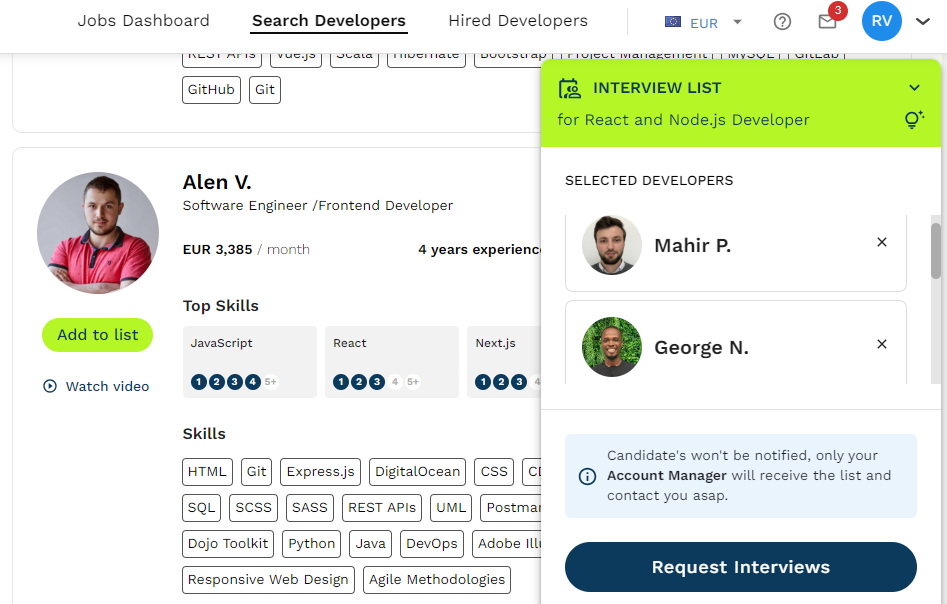Hello, hello!
It’s been quite some time since our last article. As per usual, here at RemoteMore, we’ve been busy upgrading our clients’ experience. The goal?
To make remote sourcing and hiring even more streamlined, easy, and successful. So you can get more stuff built while spending less time and money.
And the subject of today’s blog post won’t be much different. In this article, we’ll talk about sourcing – more specifically, where to source remote developers. However, we’ll still follow the same principles outlined above so that you can make the best hiring choice for yourself and your business.
Now, without further ado, let’s share the most common places and ways to find remote developers. Spoiler alert! Some ways may be better than others, but all have their advantages and disadvantages that we’ll describe in detail. Let’s go!
1. RemoteMore
As you perhaps know, RemoteMore is a hiring platform for remote developers and designers. We’ve spent years perfecting our flow so we can match companies with remote software developers as swiftly, easily, and effectively as possible. What’s most important is that we help you throughout all the steps of the recruitment process, and you pay only if you hire successfully at the end.
Below, we’ll share all of the advantages and disadvantages of using our platform.
RemoteMore Advantages
1. Large Pool of 32,000+ Pre-Screened Developers
Currently, there are more than 32,000+ remote developers registered on our platform. All our developer job seekers are pre-screened for Technical and English skills. This means you can be sure of the quality of the developers when hiring through our platform compared to other ways of sourcing. And on top of that – you have plenty of choice!
2. Salary Discovery
RemoteMore solves one of the most difficult and uncomfortable parts of the sourcing process – handling salary expectations.
On RemoteMore, we’ve pre-negotiated salaries with all developers signed up on our platform. This means the salary you see on developer profiles is the final price you’ll pay for hiring the developer (based on 160 working hours per month, including all taxes and fees).
To achieve the best ratio between quality/skills and salary, we’re leveraging primarily two assets.
- Our advanced salary data from over 150+ countries – we’ve used many internal and external data sources as well as complex data modeling algorithms to calculate the optimal salaries and suggest them to developers.
- As part of the developer onboarding, we actively negotiate the developer salaries to ensure that when you open RemoteMore, you immediately know the fair salary each candidate would accept.
This is how we achieve a symbiosis, where developers are happy with the salary they’ll be getting, and at the same time, companies get the most value for their money.
3. Handpicked Candidates
One of the most tedious tasks in the sourcing process is the filtering of candidates. Sure, if you use the right channel, you can attract or find many great candidates. However, do you have the time and expertise to filter through 100, 300, or even more candidates and find the most suitable one?
At RemoteMore, we do this for you completely for FREE. With just a click of a button, you can request handpicked candidates for your job, and our team will manually pick the 5 best candidates that are ready to be interviewed.
4. Interview Lists
When it comes to interviewing remote developers, figuring out everyone’s availability and time slots for interviews can be so time-consuming. Navigating multiple people between multiple different time zones is such unnecessary work for your busy schedule.
At RemoteMore, we have solved this problem with our brand-new Interview List feature. You simply add the candidates you want to your Interview List and then click on “Request candidates”. From there, your Dedicated Account Manager will contact you and the developers and figure out the best time to book the meetings. All you have to do is attend the interviews and choose the developer/developers you like the most!

RemoteMore Disadvantages
1. Locked Data
We believe that our data is among the top 1-2% in terms of quality in the industry. That’s why not all of our data is available before an admin from our side approves your company. If you want to learn more about our data and unlock premium features on our platform, get in touch with us at contact@remotemore.com.
2. Long-Term Jobs
Perhaps the biggest disadvantage of RemoteMore is that most of the developers on our platform are seeking a long-term job/project (usually 6+ months). This means you’re unlikely to find many good candidates willing to work for you for just a few weeks.
However, if you have a short-term project that you need to complete, we got you covered! We recently opened to the wider public our “Managed Project” services. With these services, we assign one of our current teams or build a team for you from scratch to complete your project.
What’s best, all of this can happen with much fewer resources compared to hiring an agency or one/multiple freelancers to complete your project. This is possible due to our extensive experience in finding, hiring, and managing remote developers to build projects for clients. Custom solutions tailored to each specific case and following strict timelines and budgets.
If you want to know more about our Managed Projects service, you can contact us at contact@remotemore.com with subject line “Project Inquiry”. We’ll be happy to assist you and answer any questions!
2. Freelance Platforms
A popular way to source remote developers is through freelance platforms. Below, we’ll share the advantages and disadvantages of using a freelance platform to source remote developers.
Freelance Platform Advantages
1. Find Qualified Candidates Fast
On freelance platforms, you can find experts with ready know-how in very niche fields. However, that’s provided you have a very, very detailed and specific job/tasks description. Otherwise, you can easily end up with a job that’s half-done or inferior quality that might cost you a lot of money.
The above is especially true for software development projects, as developers are usually not interested (and not skilled) in figuring out your business requirements. You would certainly need to provide a perfectly complete and clear scope of the work that needs to be done.
2. Independent Work
If you need people with specialized expertise to work on one-time tasks without much need for collaboration or understanding of your company’s bigger picture – then the freelance platforms are a good fit in terms of this.
3. Little to No Onboarding/Management
On freelance platforms, you can find many independent and reliable executors. Again, provided you can describe your requirements in detail and filter manually through lots of bad candidates.
Freelance Platforms Disadvantages
1. Company culture
Freelancers are, by definition, unfamiliar with your company’s culture, product, and business objectives. They are not suitable for complex projects that require a deep company/product knowledge and coordination among different people or teams in your company.
2. Limited Control Over the Outcome
Typically, you have very limited management control over the work process of the freelancers – and, respectively, the end result.
3. Lack of Knowledge Retainment
When you hire a freelancer to do a specific job, you’re not retaining knowledge in your company. The next time the same/similar issue arises or a task of a similar nature needs to be completed, you’ll need to hire a freelancer again. This is a potentially big waste of time and resources when you have recurring types of tasks.
4. Limited Availability and Attention
Freelancers naturally juggle multiple projects at the same time. Due to their limited bandwidth, you can not expect them to be available when you need them or pay as much attention to your project as you’d like, resulting in unnecessary delays.
5. Much More Expensive
Many people think they save money when they hire freelancers, but that is not necessarily true in almost 100% of the cases. Freelancers compensate for the insecure and short-term nature of their work with higher fees and charge much more than a typical full-time employee would. In a past blog post, we showed you a real-life example of how a freelancer can be 4x more expensive than a full-time remote developer.
3. Job Boards
Job boards are the most common way for companies to source developer candidates. Let’s break down the main pros and cons of using a job platform to source remote developers below.
Job Boards Advantages
1. Large Number of Candidates
The main advantage of job platforms is that you can passively get lots of candidates within 2-4 weeks if you have an established and skilled recruitment team to filter through those candidates, that might be a good strategy.
2. Budget-friendly
Most job platforms have very budget-friendly fees compared to recruitment agency fees or even freelance and hiring platforms such as RemoteMore. However, bear in mind that posting on a job board doesn’t guarantee you, in any case, you’ll be able to hire somebody successfully.
In fact, a study by Career Plug discovered that job boards produced 88% of all applications but only 29% of hires.
That’s very different from hiring platforms like RemoteMore, where you pay only when you hire someone successfully.
Job Board Disadvantages:
1. Location Constrained
Apart from the fact that you’ll have to manually filter through lots of candidates and you have no guaranteed success for the money you spend, another disadvantage of job boards is location constraints.
Most job platforms are focused on specific geographic locations. This means you’ll have to post on multiple job platforms (and manage different systems) if you want to have applicants from different countries. This isn’t the case with freelance platforms or RemoteMore, where you have remote developers from all around the world in a single place.
2. No Pre-Screening or Background Check
A not-so-obvious disadvantage of job platforms is that anyone can register on them. In practice, this means the information in the candidates’ CV or application may be false or misleading at worst, or simply a poor fit with what you need at best.
To compare RemoteMore, we do a background check of all candidates, making sure they are who they say they are, and that their described expertise is true and accurate.
Final Words
There are lots of platforms and ways to source for remote developers. Regardless of which one you choose, you’ll have to carefully assess your current and future needs. Most importantly, don’t rush this decision, as sourcing and hiring the wrong candidates may be detrimental to your organization, especially if you are an early-stage startup.






